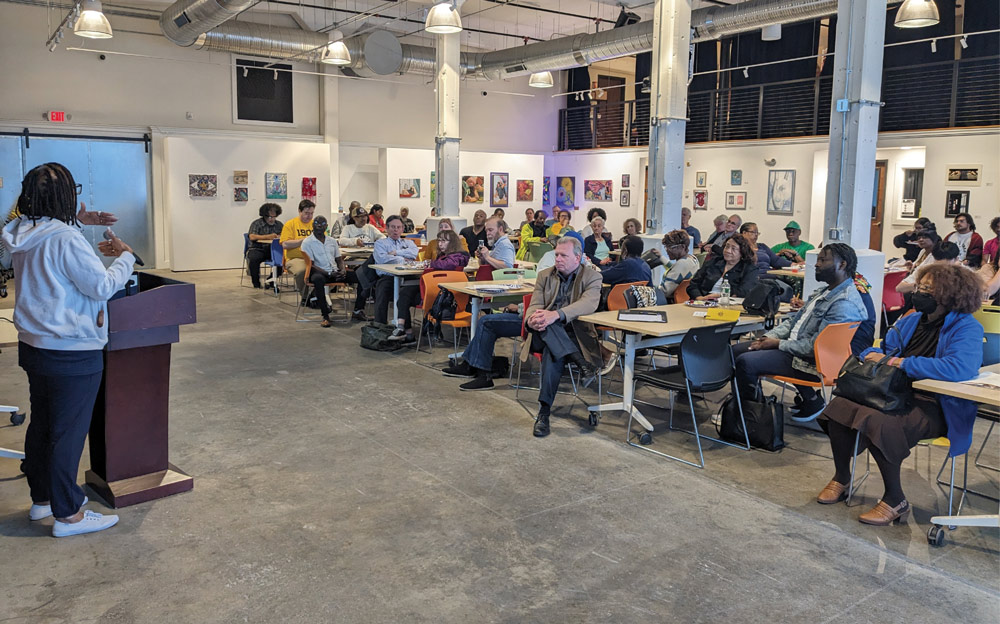Ideas for Criminal Justice Reform
About half of the class were Vassar students and the others were members of the local chapter of the NAACP. The goal: Convene community gatherings to seek opinions from Hudson Valley residents about the workings of the criminal justice system. Using this input, members of the class developed suggestions for specific policy changes they believed ought to be made by those involved in the local criminal justice system. Some funding for the course was provided by Vassar’s Community-Engaged Intensives in the Humanities initiative, funded by the Mellon Foundation.
This spring, the class hosted two community forums attended by several dozen community residents as well as attorneys and staff of the Dutchess County District Attorney’s Office, including DA Anthony Parisi. After the first session, students looked for common themes raised by those in attendance and conducted significant research. After presenting their suggestions for feedback at the second session, students offered the following policy recommendations to the District Attorney’s Office.
Student Policy Recommendations
DA Parisi said, “I believe that transparency is the cornerstone of public trust and ensures accountability. Working with this class allowed me and my office to hold informed conversations about prosecution policies and priorities. Without meaningful public policies, unchecked prosecutorial discretion can lead to unequal treatment, rogue prosecutors, confusion for victims and defendants, and the inability of our residents to understand and effectively question what’s happening in our justice system.” My office is moving forward with hopes of bringing clarity to the criminal justice system for the residents of Dutchess County.”
Robinson, founder and CEO of Equitable Future, Inc., a Poughkeepsie-based civil rights, policy development, and advocacy organization that promotes dialogue and discussion of criminal justice issues, said he was encouraged by the initial response from the district attorney. “There was an acknowledgment that some policies in the past may have affected people of color disproportionately,” he said. “It was good to see so many people getting involved.”
Two students who took the course said they were encouraged by the work that has been done so far. “I saw this course as an opportunity to learn more about the local community and react in a meaningful way,” said Maham Rahman ’25, an international studies major from Queens, NY. “District Attorney Parisi seemed open to our ideas; he was interested in developing ways to actively recruit lawyers of color for the office and to put other policies in place. And it was great having non-Vassar students in the class. I learned a lot about the local community.”

Means said she intends to continue this work in a full-semester course. “I want to find more ways to benefit the community,” she said, “and we can do that by facilitating collaborations between students, teachers, and community members, and employing many of Vassar’s resources.”
True to her word, Means followed the spring semester with another class—this time co-teaching in the Exploring Transfer (ET) program, a month-long campus experience for community college students this summer. She co-taught the course with Carolyn Carr, a faculty member at Westchester Community College, and was supported by teaching assistant Amalia Oliva Rojas, a 2012 ET alum, accomplished playwright, and current Columbia graduate student.
The course, The Past, Present, and Future of Race, Punishment, and Criminal Justice in the United States, provided an overview of the U.S. justice system, examining the role of race, ethnicity, and politics. Students also learned about historical and contemporary efforts to reform the criminal justice system.
For the final project, student worked with classmates to reenact historic criminal trials, including the trial of the men accused of murdering Emmett Till, a Black teen who was abducted and lynched in Mississippi in 1955, and a case involving the fatal beating of Chinese-American Vincent Chin in an anti-Asian attack in 1982.
In a statement, Carr, Means, and Rojas summarized their experience of the session this way: “This course and culminating performance would be impossible without the ET village. We are particularly grateful for our students’ willingness and trust in the challenging and emotional process of co-creating a salient and powerful course that elevates stories and trials of (in)justice as we collectively seek truth, foster resistance, and build resilience. This work is particularly timely as the world grapples with democratic- and justice-related challenges that disproportionately impact BIPOC communities.”